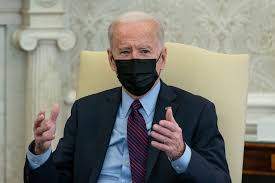Biden: US Won't Lift Iran Sanctions

U.S. President Joe Biden says he will not lift economic sanctions against Iran unless Tehran first cuts its uranium enrichment back to the level it agreed to in the 2015 international treaty aimed at restraining its development of nuclear weapons.
Biden has said he wants the U.S. to rejoin the nuclear treaty with Iran that former President Donald Trump withdrew the U.S. from.
But when asked directly in a CBS News interview that aired Sunday whether the U.S. would lift sanctions first to get Iran to return to negotiations, Biden replied simply, “No.”
He nodded in agreement with CBS anchor Norah O’Donnell that Tehran must first stop enriching uranium at a higher level than allowed under the treaty.
The pact had allowed Iran to enrich uranium at a 3.67% concentration level. But since mid-2019, it had pushed enrichment to a 4.5% level, and then last month to 20% — a level it had achieved before the accord.
Experts say Tehran now has enough low-enriched uranium stockpiled for at least two nuclear weapons, if it chooses to pursue their manufacture. But Iranian officials, to the long skepticism of Western governments, have long maintained that its nuclear program is for peaceful purposes.
Iranian Supreme Leader Ayatollah Ali Khamenei said on state TV that if the United States wants “Iran to return to its commitments, the U.S. must lift all sanctions in practice, then we will do verification and see if the sanctions were lifted correctly, then we will return to our commitments."
Khamenei’s televised remarks were his first since Biden’s January 20 inauguration.
But in a CNN interview after Khamenei's remarks, Iranian Foreign Minister Mohammad Javad Zarif said that there was no precondition that Iran receive compensation from the United States for the cost of sanctions imposed by Washington before restoring the nuclear pact.
In the CBS interview, Biden also discussed U.S. relations with China, acknowledging that since taking office he had yet to speak with Chinese President Xi Jinping, although Biden has talked with numerous other world leaders.
Biden said, “There was no reason not to call him.” He offered some praise of Xi but warned that relations between the countries would be different than they had been under Trump.
“He’s very bright. He’s very tough,” Biden said of Xi. “He doesn’t have — and I don’t mean it as a criticism, just the reality — he doesn’t have a democratic, small D, bone in his body.”
“I’ve said to him all along that we need not have a conflict,” the U.S. leader said, recalling discussions with Xi when Biden was the U.S. vice president from 2009 to 2017. “But there’s going to be extreme competition. And I’m not going to do it the way that he knows. And that’s because he’s sending signals, as well. I’m not going to do it the way Trump did. We’re going to focus on international rules of the road.”
Photo: President Joe Biden speaks in the Oval Office of the White House, in Washington, Feb. 5, 2021.
Link: https://www.voanews.com/middle-east/biden-us-wont-lift-iran-sanctions











